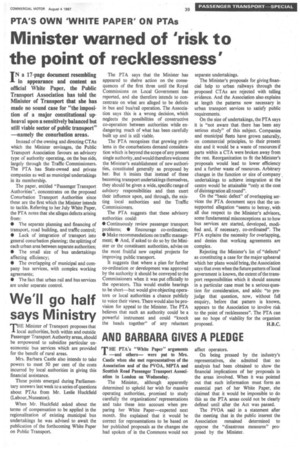Minister warned of 'risk to the point of recklessness'
Page 41

If you've noticed an error in this article please click here to report it so we can fix it.
IN a 17-page document resembling
in appearance and content an official White Paper, the Public Transport Association has told the Minister of Transport that she has made no sound case for "the imposition of a major constitutional upheaval upon a sensitively balanced but still viable sector of public transport" —namely the conurbation areas.
Instead of the owning and directing CTAs which the Minister envisages, the Public Transport Association favours an advisory type of authority operating, on the bus side, largely through the Traffic Commissioners. The PTA has State-owned and private companies as well as municipal undertakings in its membership.
The paper, entitled "Passenger Transport Authorities", concentrates on the proposed Conurbation Transport Authorities since these are the first which the Minister intends to tackle. Referring to her July White Paper, the PTA notes that she alleges defects arising from: • The separate planning and financing of transport, road building, and traffic control; • Lack of integration of transport into general conurbation planning; the splitting of each urban area between separate authorities; • The small size of bus undertakings affecting efficiency; • The overlapping of municipal and company bus services, with complex working agreements; • The fact that urban rail and bus services are under separate control. The PTA says that the Minister has appeared to shelve action on the consequences of the first three until the Royal Commissions on Local Government has reported, and she therefore intends to concentrate on what are alleged to be defects in bus and bus/rail operation. The Association says this is a wrong decision, which neglects the possibilities of constructive co-operation between authorities while endangering much of what has been carefully built up and is still viable.
The PTA recognizes that growing problems in the conurbations demand consideration which is beyond the scope of any present single authority, and would therefore welcome the Minister's establishment of new authorities, constituted generally as proposed by her. But it insists that instead of these becoming transport undertakings themselves, they should be given a wide, specific range of advisory responsibilities and then exert their influence upon, and through, the existing local authorities and the Traffic Commissioners.
The PTA suggests that these advisory authorities could: • Continuously review passenger transport problems; * Encourage co-ordination; • Make recommendations on traffic management; • And, if asked to do so by the Minister or the constituent authorities, advise on the most fruitful new capital projects for improving public transport.
It suggests that where a plan for further co-ordination or development was approved by the authority it should be conveyed to the Commissioners when it was put officially to the operators. This would enable hearings to be short—but would give objecting operators or local authorities a chance publicly to voice their views. There would also be provision for appeal to the Minister. The PTA believes that such an authority could be a powerful instrument and could "knock the heads together" of any reluctant separate undertakings.
The Minister's proposals for giving financial help to urban railways through the proposed CTAs are rejected with telling evidence. And the Association also explains at length the patterns now necessary in urban transport services to satisfy public requirements.
On the size of undertakings, the PTA says it is "not aware that there has been any serious study" of this subject. Companies and municipal fleets have grown naturally, on commercial principles, to their present size and it would be a waste of resources if parts within a CTA were broken away from the rest. Reorganization to fit the Minister's proposals would lead to lower efficiency and a further waste of resources. Arbitrary changes in the function or size of company _ undertakings to achieve integration at the centre would be attainable "only at the cost of disintegration all round".
On the "basic defect" of overlapping services the PTA document says that the unsupported allegation "seems to betray, with all due respect to the Minister's advisors, some fundamental misconceptions as to how bus services are started, developed, modified and, if necessary, co-ordinated". The PTA explains the necessity for overlapping, and denies that working agreements are complex.
Rejecting the Minister's list of "defects" as constituting a case for the major upheaval which her plans would bring, the Association says that even when the future pattern of local government is known, the extent of the transport responsibilities which it should assume in a particular case must be a serious question for consideration, and adds: "to prejudge that question, now, without full enquiry, before that pattern is known, appears to the Association to involve risk to the point of recklessness". The PTA can see no hope of viability for the organism proposed. H.B.C.












































































































